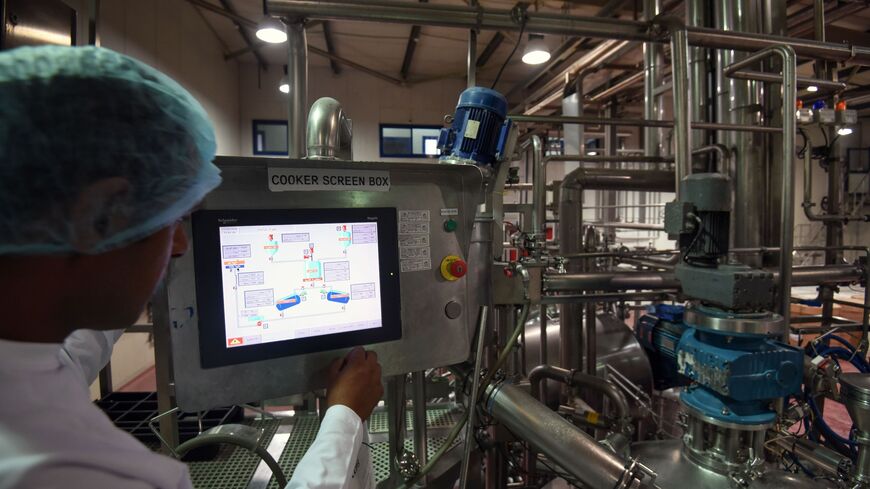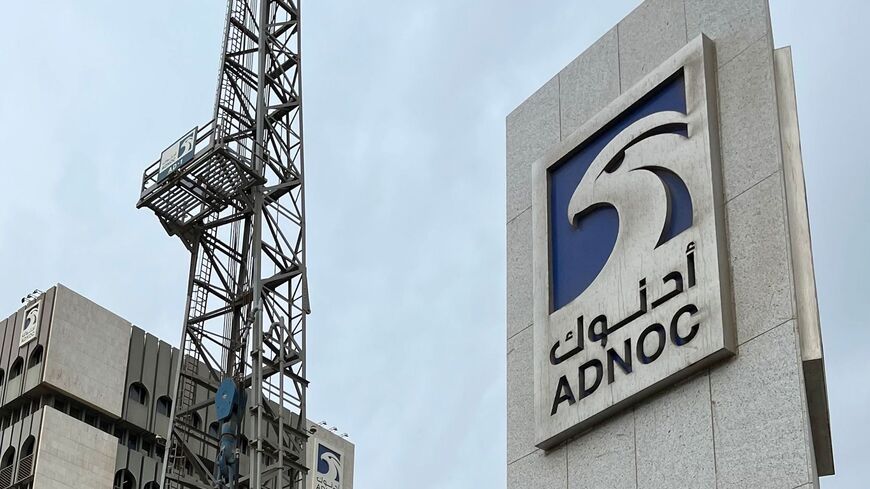Egypt’s bid to localize electronics manufacturing starts to pay off
Al-Monitor Pro Members
Marc Español
Journalist covering Egypt and Sudan
June 20, 2023
Egypt has not traditionally specialized in the production of electronics and has heavily relied on tech imports — but this is slowly starting to change. South Korean electronics giant Samsung announced on June 2 that it will set up a new factory for the assembly of smartphones in a Beni Suef industrial complex in Egypt where it already has another factory in which it manufactures electronic products such as cell phones, TVs and tablets. In mid-June, Chinese multinational tech company Vivo revealed to Egyptian business newspaper Al-Mal that it has also started manufacturing smartphones in a factory in the 10th of Ramadan city, near Cairo, for both the domestic and export markets. News of such expansions in the country by big industry names are becoming increasingly frequent, signaling how this nascent industry is beginning to pick up steam on the back of the government’s eager plans to localize it.
- Egypt launched in 2015 an initiative called Egypt Makes Electronics (EME) that aims to localize the industry, position it as a key driver of economic growth, attract foreign investment, foster employment, increase exports and reduce imports.
- The initiative has two main goals: enable the design and production of high value-added electronic circuits and systems backed by a high level of technical support in Egypt, and develop a labor-intensive electronics manufacturing industry.
- The items that the initiative considers most promising for local manufacturing and export include smartphones, tablets, GPS devices and complementary items such as batteries, as well as lighting products, TVs, LED displays and solar systems.
- Egypt seeks to capitalize on factors that give it a competitive edge, including a cheap but large labor market with a sizeable talent pool resulting from its well-positioned tertiary education; a large domestic consumer market; and a strategic geographic location, close to fast-growing markets in Africa and the Middle East.
- Egypt is still a net importer of electronics and electrical (E&E) equipment, but its exports have grown steadily in the last few years, from $1.56 billion in 2018 to $2.56 billion in 2022, data from the International Trade Centre (ITC) show.
- Today, Egypt’s E&E exports account for 5.3% of its total merchandise exports, up from 3.9% a decade ago.
- The top destinations for E&E exports in the period from 2018 to 2022 were the UK (14.6%), the UAE (10%), Slovakia (8.46%), France (7.6%), Turkey (6.4%) and Saudi Arabia (6.27%), ITC data show.
- Egypt specializes in the production of final consumer appliances and electrical components. But the government is working to boost the localization of design in the sector to bring more value added, and it has put in place a raft of incentives to attract investors to set up electronics design and development ventures in Egypt.
- A rising number of companies from medium- and high-tech sectors are choosing Egypt to produce for Africa and the Middle East. Between 2017 and 2020, Egypt attracted the largest share of FDI in E&E from Africa, according to the OECD.
- To try to ensure the success of the EME initiative, Egypt’s government is seeking to also create the right environment to make skilled workforce available. This includes investment in and fostering of innovation and research centers, advanced labs, tech parks, training academies and incubators. The latest to make the move was ElSewedy EdTech, the education investment arm of Egypt’s ElSewedy Capital, which announced in June the establishment of a new technology-polytechnic university that will include a program in E&E engineering technology.
- The subsector that has been recently drawing the most attention is that of mobile phone manufacturing. There are now four international brands present in Egypt: Samsung, Chinese firm Infinix Mobile, Finnish HMD Global, which produces phones under the Nokia brand, and Vivo.
- The industry also includes Egyptian player Sico, which manufactured the first domestic smartphone back in 2019.
- In February, Egypt’s parliament approved a raft of measures to boost this nascent local industry, including a significant reduction in customs tariffs and the waiving of a development fee charged on mobile phone components such as batteries.
- These measures will also benefit all players in the sector that are going to start localizing part of their production in Egypt or want to increase it. In the pipeline is Chinese company Xiaomi, which plans to open a phone factory in the second half of the year, HMD Global, which plans to increase its production in Egypt to start exporting before the end of 2023, and Chinese manufacturer Oppo, which in September 2022 expressed interest in coming to Egypt.
- In late November 2022, the government also signed agreements with 29 global tech companies to increase investments in Egypt. These include industry giants such as IBM, Microsoft, Amazon, Vodafone and Dell though few details about these deals have been unveiled.
Scenario 1: Government measures, greater import flexibility lure international firms in
A growing number of companies decide to relocate part of their production to Egypt as the government’s bid to develop the electronics industry, coupled with the potential that Egypt holds for its domestic market and strategic position in Africa and the Middle East, pays off. Home-grown brands benefit from the boom as well.
For this to happen, Egypt’s economic situation will also need to stabilize to ensure reliable imports of key components for the industry and the growth of the local consumer market.
Scenario 2: Hurdles, economic headwinds prevail and expansion in the sector stagnates
Egypt has tried in the past to localize the electronics industry without success, mainly because of its inability to overcome challenges and create conditions that are suitable and attractive enough for the sector to prosper domestically and in foreign markets.
Today, the main hurdles for both manufacturers and investors continue to be excessive bureaucracy, unreliable imports of key import materials, brain drain and skill shortages, limited technical and vocational education, and low engagement with global value chains.
The E&E manufacturing sector in Egypt is still relatively small and at a nascent stage, but the country has successfully built a strong local base and has plenty of room and potential for growth in the future. Due to the authorities’ commitment to boost the industry, in the short and medium term the country is bound to continue to attract the interest of foreign manufacturers and investors to locate part of their production there with an eye on its large domestic market and the potential for export. Yet it remains to be seen if the industry unleashes its full potential and becomes the key driver of the country’s economic growth that the government aspires to. To get there, authorities will still have to address major challenges in terms of bureaucracy, competitiveness, skills, logistics and access to other markets that for now continue to limit its explosion.
Marc Español has been reporting on Egypt since 2017, with a focus on the economy and the human rights situation in the country. He has been a contributor to Al-Monitor since 2018 and his work has appeared in other publications such as El País and the think tanks Fundación Alternativas and the European Institute of the Mediterranean (IEMed).
We're glad you're interested in this memo.
Memos are one of several features available only to PRO Expert members. Become a member to read the full memos and get access to all exclusive PRO content.

Already a Member? Sign in
The Middle East's Best Newsletters
Join over 50,000 readers who access our journalists dedicated newsletters, covering the top political, security, business and tech issues across the region each week.
Delivered straight to your inbox.
Free
What's included:
Free newsletters available:
- The Takeaway & Week in Review
- Middle East Minute (AM)
- Daily Briefing (PM)
- Business & Tech Briefing
- Security Briefing
- Gulf Briefing
- Israel Briefing
- Palestine Briefing
- Turkey Briefing
- Iraq Briefing
Premium Membership
Join the Middle East's most notable experts for premium memos, trend reports, live video Q&A, and intimate in-person events, each detailing exclusive insights on business and geopolitical trends shaping the region.
$25.00 / month
billed annually
$31.00 / month
billed monthly
What's included:
Memos - premium analytical writing: actionable insights on markets and geopolitics.
Live Video Q&A - Hear from our top journalists and regional experts.
Special Events - Intimate in-person events with business & political VIPs.
Trend Reports - Deep dive analysis on market updates.
We also offer team plans. Please send an email to pro.support@al-monitor.com and we'll onboard your team.
Already a Member? Sign in



b5b6.jpg)



